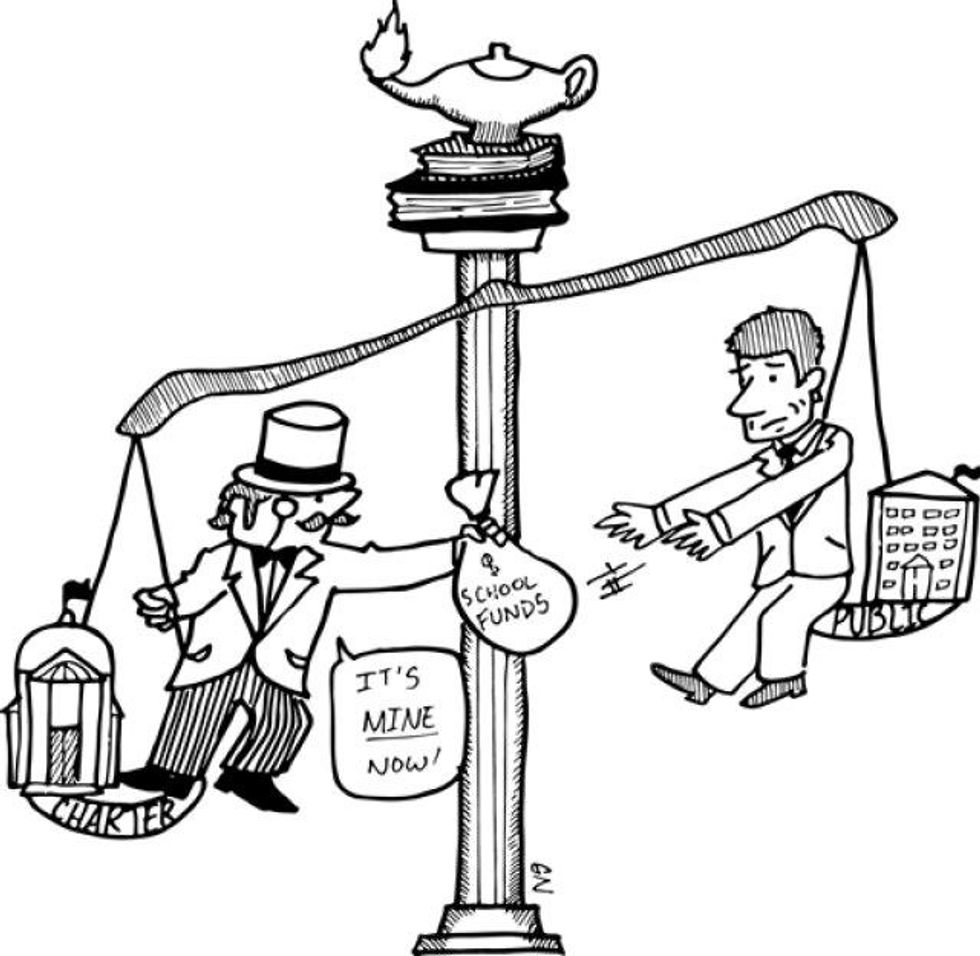" Education then, beyond all other devices of human origin, is the great equalizer of the conditions of men, the balance-wheel of the social machinery." - Horace Mann
Whether it be the plastic bag tax or the MTA, New York City Mayor De Blasio has often clashed with Governor Cuomo as City Hall and Albany vie for influence and final says on important policies that affect New Yorkers. One front-and-center example of this can be seen in Mayor De Blasio’s recent education initiatives, proposed last year.
Charter schools are schools that are publicly funded but are allowed freedom to be more independent, by implementing their own curriculum, testing policies, textbooks, disciplinary codes, etc. These schools operate under a local charter as opposed to following school district regulations. In their charters, schools promise certain academic results and expectations, and are held accountable to these pledges, risking closure if they are unable to meet these standards. Today, over 95,000 students attend 205 charter schools in New York City, according to the New York City Charter School Center.
The most controversial parts of the mayor’s plan would halt the expansion of charter schools in favor of prioritizing public schooling. This includes eliminating free space for charter schools, and reorienting financial resources away from charter schools. However, Albany has struck down many of De Blasio’s initiatives. Despite this, the city continues to defend its policy of improving public education.
Although I am certainly no avid supporter of Mayor De Blasio or some of his policies, I stand with his administration on this issue, both as a high school student and a New Yorker. While some charter schools have found success in the short-term, this radical new experiment will serve only to rot out what is supposed to be the core of American education - excellent public schools accessible to all students. We need to work on improving our existing public school facilities rather than continuing to support ineffective charter schools.
Proponents of charter schools claim that these schools provide students who are in economically-strapped school districts with a second choice - innovative facilities that limit bureaucracy, a chronic problem in some poorly performing schools. Furthermore, these "innovative" schools are meant to introduce competition into the public education equation, which would, in theory, raise educational standards throughout a particular school district.
Performance and class sizes are often the most prominent argument for charter schools, but the misconception that these facilities always produce better results falls apart under scrutiny.
According to a 2013 study by the Center for Research on Education Outcomes, 22% of NYC charter school students had significantly better learning outcomes in reading than traditional public schools while 25% saw significant worse learning outcomes.
The Washington Post also reported that when you examine charter school and public school performance on the ELA test - taking out factors such as ELL students who attend NYC public schools at a three-fold rate - 50% of those in public schools were proficient compared to those in charter schools. The same analysis of data for the math test shows charter schools with a slim advantage in terms of proficiency. This demonstrates that charter schools are on a broader level, unable to deliver academic results that considerably surpass public schools and in some cases, charter schools do worse.
If we look past the numbers and explore a common argument in favor of charter schools, which is that these schools provide families of students with more choices in schooling, one has to wonder what kind of options are there and who exactly will have access to them. Despite all the misconceptions surrounding this, charter schools are extremely exclusionary because they are allowed to select a particular performance-based group of people to attract as students.
Charter schools, which often advocate for better education in poorer districts that have a disproportionate number of Hispanic and African-American students, are doing exactly the opposite. In the name of producing greater opportunity, they’ve created schooling environments that are highly segregated. According to the Civil Rights Project, at least 90% of NYC charter schools have a student body that is less than 10% white, with almost 75% of charter schools having less than 1% white enrollment.
Public schools are the mainstay of the American education system and by funneling money and focus away from these institutions into charter schools, an ineffective and indecisive fiscal policy is established which could ruin public education for those in poorly performing schools who were unable to attend charter schools.
In regard to funding, there is little transparency when it comes to allocations and administrative practices available to the general public, due to the fact that charter schools are not obligated, under the Freedom of Information Act, to release the same data that public schools are mandated to. This gives way to fiscal corruption and produces a vacuum of funding from school districts, many of which are already struggling and in desperate need of financial assistance. On top of this, charter schools often allocate less funding per student than public schools, which only serves to prove that these institutions not only consume a massive amount of city resources, but also do not use these resources to directly invest in students.
Thus, I am firmly against the continued expansion of charter schools and instead, in favor of substantive policies that will champion public schools. A nation cannot succeed without education, and an education system cannot succeed if an environment is created where financial irresponsibility, hyper-segregation, and a lack of accountability are considered legitimate long-term options for the students of New York City.





















